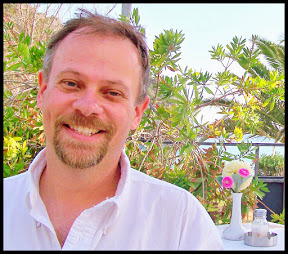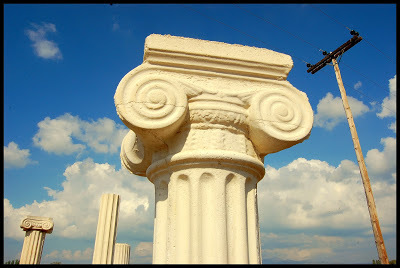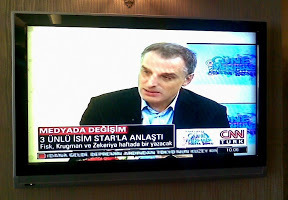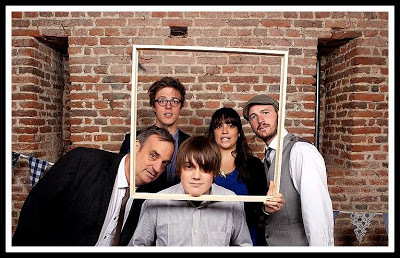Paul Alkazraji's Blog, page 6
April 17, 2014
The Independent's '48 Hours in Munich' revisited

'Just passing by... Odeonsplatz then and now.'
In '97 I wrote this article for London's 'The Independent'. With the help of a friend last month we snapped the same spot with yours truly in the frame.
Surprisingly, the article is still on line, and much of it still stands... This time round I bought a toy wooden soldier from Erzgebirge but the nut cracked its mouth!
City Breaks: 48 hours in the life of Munich
Why go now?
Because the raucous, back-slapping merriment of the Oktoberfest is well and truly over. Fewer people will bang on the roof of your taxi slurring "Ish muss mit Ulf sprechen!" Munich is now emptied of its beer-guzzlers, apart from the natives...
http://www.independent.co.uk/news/edu...
Also by this writer: The Silencer
Published on April 17, 2014 04:00
•
Tags:
glockenspiel, hofbrauhaus, marienplaz, munich, odeonsplatz, residenz, the-independent
February 6, 2014
A Superior brand of fiction
Interview with Tom Hilpert, author of the Lake Superior Mysteries.
By Paul Alkazraji, author of The Silencer

Tom Hilpert.
Tell us a little about yourself.
I’m a missionary kid – I grew up in Papua New Guinea. I’ve always loved books, and I’ve always loved writing. It’s been a thrill these past few years to finally be able to express that.
Tell us a little about your books.
I have a little ‘series’ going: the Lake Superior Mysteries. You can read them out of order, but each book features the same setting and cast of characters. The first two are ‘Superior Justice’ and ‘Superior Storm’. My latest in the series is ‘Superior Secrets’. The main character is a pastor named Jonah Borden, who lives in a small town on the shore of the world’s largest freshwater lake (Lake Superior). Typically, he gets caught up in mysteries as he tries to help his parishioners.
In the first one (Superior Justice), a parishioner is arrested for murder. Borden talks to him about it, and hears his confession. Only the confession isn’t of guilt – it is the parishioner’s alibi. Now Borden knows he is innocent, but he can’t tell anyone how he knows, or what he knows. The adventures come as Borden tries to prove him innocent without revealing the secret confession. In the second (Superior Storm) Borden ends up in the middle of a mystery as he tries to help an elderly widow recover her stolen money. The latest (Superior Secrets) is a little more personal for Jonah Borden. His fiancée, Leyla Bennett, is a reporter who wants to do an investigative report on a local cult. She joins the cult ‘under-cover’, but after a while it looks as if she might have been brainwashed into really being a member. As Jonah tries to get her out, he uncovers something much bigger than he ever imagined.
Is there an aspect of it you are particularly pleased with?
These are strong, memorable characters who are also a little quirky. There tends to be quite a bit of humor peppered throughout the books. My readers seem to appreciate that, and I admit I am kind of pleased with it myself. I’m a pretty serious guy in person, but I enjoy writing witty and funny dialogue, and hearing from fans about it.
Share with us a paragraph of your choice from your new book.
[Well, in keeping with my answer above]:
‘On Sunday, in honor of my name, I preached a whale of a sermon. It was hard to tell how many people fell asleep, because it was cold out, and some people cheated by keeping their scarves on, but I bet it was less than six. My record was thirteen, but that time was a funeral, and there were a lot of old people attending who were worn out by grief and late nights of watching Wheel of Fortune. Of course, it was always hard to tell the sleepers apart from the Norwegian Lutherans, not to mention the dead people. They all tended to express the same amount of emotion. I consider myself an elite preacher, because I regularly inspire a few Lutherans to nod in agreement when I’m speaking.'
Tell us about something you like or dislike in one of your characters.
One of the ‘supporting cast’ of characters is Julie, the part time secretary. A lot of my fans seem to really like her, but she makes me just a little uncomfortable. She’s a little too literal-minded and a little too sarcastic, but I guess that makes her seem pretty real.
Fiction writers put characters in dramatic situations ultimately to ‘say’ something. What are you saying in your work?
I think I have an overall message for the series, and that is that Christians – even pastors – are real people. They aren’t perfect, but they aren’t what the media usually makes them out to be, either. The faith of the two main characters is real, and it makes a difference, but this isn’t a morality play. Faith comes into the story because they are people of faith, not because the story is ‘about’ faith, so to speak. One way I like to think about it is this: I do not write ‘Christian fiction’. I am a Christian who writes fiction. Spiritual things come up in the books because the characters are spiritual people, not because I’m trying to use the book as a platform to preach. Even though Jonah Borden (the protagonist) is a pastor, you will never find the content of one of his sermons in these books. I’ve had some positive feedback about this approach – from people who are not Christians, especially.
How does your faith influence your writing?
One of my hopes in writing is to let my faith shine through in a way that is real, not contrived. Mostly, these are fun mystery stories; they happen to involve people of genuine faith. As such, I try to be true in my writing to that aspect of the characters, just as I try to be true to the agnosticism of one of the supporting characters.
What aspect of the craft of writing do you find most enjoyable?
That’s tough. I enjoy dialogue, for sure. My characters often surprise me, and make me laugh.
What books or authors do you like to read?
I am voracious and omnivorous in my reading. I read mystery, historical adventure, Young Adult fiction, fiction classics, fantasy, western, non-fiction history, non-fiction psychology, non-fiction science, Christian classics, and contemporary Christian living.
Tell us about something you’ve read recently that moved you.
The Pressure is Off, by Larry Crabb (non-fiction); The Goose Girl by Shannon Hale (fantasy fiction).
What are you most thankful for in life?
My wife and children.
Links:
Superior Justice:
http://www.amazon.com/gp/product/B003...
Superior Storm:
http://www.amazon.com/Superior-Storm-...
Superior Secrets:
http://www.amazon.com/Superior-Secret...

By Paul Alkazraji, author of The Silencer

Tom Hilpert.
Tell us a little about yourself.
I’m a missionary kid – I grew up in Papua New Guinea. I’ve always loved books, and I’ve always loved writing. It’s been a thrill these past few years to finally be able to express that.
Tell us a little about your books.
I have a little ‘series’ going: the Lake Superior Mysteries. You can read them out of order, but each book features the same setting and cast of characters. The first two are ‘Superior Justice’ and ‘Superior Storm’. My latest in the series is ‘Superior Secrets’. The main character is a pastor named Jonah Borden, who lives in a small town on the shore of the world’s largest freshwater lake (Lake Superior). Typically, he gets caught up in mysteries as he tries to help his parishioners.
In the first one (Superior Justice), a parishioner is arrested for murder. Borden talks to him about it, and hears his confession. Only the confession isn’t of guilt – it is the parishioner’s alibi. Now Borden knows he is innocent, but he can’t tell anyone how he knows, or what he knows. The adventures come as Borden tries to prove him innocent without revealing the secret confession. In the second (Superior Storm) Borden ends up in the middle of a mystery as he tries to help an elderly widow recover her stolen money. The latest (Superior Secrets) is a little more personal for Jonah Borden. His fiancée, Leyla Bennett, is a reporter who wants to do an investigative report on a local cult. She joins the cult ‘under-cover’, but after a while it looks as if she might have been brainwashed into really being a member. As Jonah tries to get her out, he uncovers something much bigger than he ever imagined.
Is there an aspect of it you are particularly pleased with?
These are strong, memorable characters who are also a little quirky. There tends to be quite a bit of humor peppered throughout the books. My readers seem to appreciate that, and I admit I am kind of pleased with it myself. I’m a pretty serious guy in person, but I enjoy writing witty and funny dialogue, and hearing from fans about it.
Share with us a paragraph of your choice from your new book.
[Well, in keeping with my answer above]:
‘On Sunday, in honor of my name, I preached a whale of a sermon. It was hard to tell how many people fell asleep, because it was cold out, and some people cheated by keeping their scarves on, but I bet it was less than six. My record was thirteen, but that time was a funeral, and there were a lot of old people attending who were worn out by grief and late nights of watching Wheel of Fortune. Of course, it was always hard to tell the sleepers apart from the Norwegian Lutherans, not to mention the dead people. They all tended to express the same amount of emotion. I consider myself an elite preacher, because I regularly inspire a few Lutherans to nod in agreement when I’m speaking.'
Tell us about something you like or dislike in one of your characters.
One of the ‘supporting cast’ of characters is Julie, the part time secretary. A lot of my fans seem to really like her, but she makes me just a little uncomfortable. She’s a little too literal-minded and a little too sarcastic, but I guess that makes her seem pretty real.
Fiction writers put characters in dramatic situations ultimately to ‘say’ something. What are you saying in your work?
I think I have an overall message for the series, and that is that Christians – even pastors – are real people. They aren’t perfect, but they aren’t what the media usually makes them out to be, either. The faith of the two main characters is real, and it makes a difference, but this isn’t a morality play. Faith comes into the story because they are people of faith, not because the story is ‘about’ faith, so to speak. One way I like to think about it is this: I do not write ‘Christian fiction’. I am a Christian who writes fiction. Spiritual things come up in the books because the characters are spiritual people, not because I’m trying to use the book as a platform to preach. Even though Jonah Borden (the protagonist) is a pastor, you will never find the content of one of his sermons in these books. I’ve had some positive feedback about this approach – from people who are not Christians, especially.
How does your faith influence your writing?
One of my hopes in writing is to let my faith shine through in a way that is real, not contrived. Mostly, these are fun mystery stories; they happen to involve people of genuine faith. As such, I try to be true in my writing to that aspect of the characters, just as I try to be true to the agnosticism of one of the supporting characters.
What aspect of the craft of writing do you find most enjoyable?
That’s tough. I enjoy dialogue, for sure. My characters often surprise me, and make me laugh.
What books or authors do you like to read?
I am voracious and omnivorous in my reading. I read mystery, historical adventure, Young Adult fiction, fiction classics, fantasy, western, non-fiction history, non-fiction psychology, non-fiction science, Christian classics, and contemporary Christian living.
Tell us about something you’ve read recently that moved you.
The Pressure is Off, by Larry Crabb (non-fiction); The Goose Girl by Shannon Hale (fantasy fiction).
What are you most thankful for in life?
My wife and children.
Links:
Superior Justice:
http://www.amazon.com/gp/product/B003...
Superior Storm:
http://www.amazon.com/Superior-Storm-...
Superior Secrets:
http://www.amazon.com/Superior-Secret...

Published on February 06, 2014 04:35
•
Tags:
christian, crime, cult, faith, fiction, humor, investigative-reporter, lake-superior, lutherans, mystery, pastor, spiritual, tom-hilpert
November 14, 2013
A story of love and adventure in ancient Greece

Pic. P. Wilson
Interview with Dan Truitt, author of ‘Spartan’s Daughter’.
By Paul Alkazraji, author of The Silencer
Tell us a little about yourself.
My full name is Daniel Perry Truitt. My maternal grandfather was a Greek immigrant to the US named Periandros Harbelis, or Perry for short. I was born in 1954 and raised in the Chicago suburbs. I grew up Catholic, became an atheist and a hippie around 1970, and then became a Christian in 1984 after studying the book of Acts. That was while simultaneously following Anthony Hopkins in a little-known role of his as St. Paul in Peter and Paul, a teleplay broadcast during Holy Week 1984. Shortly after that, I determined that I had been called to Greece. My best friend in the US jokes that I “came to Greece to give the Greeks the Bible in their own language.”
Tell us about your new book.
Spartan’s Daughter is the story of a nineteen year-old girl who leaves Sparta, her native city-state, because her options there as a woman are limited. According to Spartan tradition, she must submit in marriage to the first man who can successfully ‘kidnap’ her! So she travels only at night, by foot, to Athens, where she has a great-uncle who will look after her. She doesn’t know that he is seriously ill and will be dead by the time she arrives. It’s the first of September, 490 BC. On the ninth of September, the battle of Marathon will be fought. She’ll be the only Spartan, and the only woman, to participate, albeit in a very small but very crucial way. Spartan’s Daughter is primarily a love story, with some adventure, a little violence, and some history thrown in.
Is there an aspect of it you are particularly pleased with?
One thing that turned out in a way I really liked and didn’t expect was the way the characters talked and acted. I’ve been in Greece nearly 25 years and I know how Greeks think and act, and why. It was easy transferring those behaviour patterns to 490 BC. After all, Greece has one of the longest unbroken cultural lines in world history. I actually got this idea from Woody Allen, in his movie Mighty Aphrodite. He opens the film with a classical face mask-wearing Greek chorus and narrator, but in the background he’s playing modern bouzouki music. I thought that was really clever.
Share with us a sentence of your choice from it.
This one illustrates the way I have Greeks thinking about their gods. Morpheus is the god of dreams. Kalliope, the main character, is dreaming. She knows that Morpheus is the man running the projector of her dreams:
“To Kalliope, Morpheus was rather like an insane but brilliant artist who was constantly coming up with bizarre situations and pictures which no one else possibly could.”
Tell us about something you like or dislike in one of your characters.
Something I like: I have the male protagonist, an Athenian mercenary named Alexandros, not be flawlessly handsome. He would be so were it not for a deep, nasty scar running from his eyebrow down through the bridge of his nose from an opponents’ sword. In moments of distress his hand goes to this scar and touches it.
Fiction writers put characters in dramatic situations ultimately to ‘say’ something. What are you saying in your latest work?
I don’t like Christian fiction in most of its modern forms. By the same token there is great need for Christian verities (true principles) to be subtly taught in the arts the same way godless atheism is. So this is an attempt to do this. I’m talking about those like physical and moral courage, sexual fidelity, and a love of the freedom our Creator gave us to be who we are. But even then I tried to tone it down a little and make this primarily a love/adventure story. I can’t stand didactic fiction, which is my main problem with Christian fiction. The only Christian novel I would give to a non-believer is Francine Rivers’s Redeeming Love, which is a beautiful 19th century take on the prophet Hosea and his unfaithful prostitute wife.
How does your faith influence your writing?
I’ve understood that God gave me storytelling and descriptive abilities to help people grasp what existence is all about. Our goal as Christians is to ultimately bring glory to our Maker. There is absolutely no point to my writing a single sentence if Biblical values do not percolate through it.
What aspect of the craft of writing do you find most enjoyable?
Watching a first draft unfold. It’s a blast, as long as you know how things will end. A second enjoyable thing is just playing with my imagination, watching two disparate ideas collide and create the germ of a story.
What books or authors do you like to read?
I love my Kindle. I just counted eighteen books that I’m reading on it right now. The last couple of years I like history and biography more and more. A good biography will have me visualizing a person, time and place pretty vividly. It’s like taking a trip in a time machine. Favourites include James Lee Burke, Stephen King, John Grisham, Flannery O’Conner, Michael Connelly, William Faulkner, Andrew Klavan, JRR Tolkien, David McCullough, and Shelby Foote. Five of those are from the American south, BTW.
Tell us about something you’ve read recently that moved you.
That’s probably a history of the American Dust Bowl in the 1930’s called ‘The Worst Hard Time’... absolutely unbelievable suffering. It changed my politics. People then had no social safety net whatsoever, and were left alone to sink or swim on their own. The other side of that coin is that the farmers in Oklahoma and the Texas Panhandle created the Dust Bowl by over-ploughing the prairie and expecting a couple decades of unusually rainy weather to continue indefinitely. They got greedy, especially with wheat prices going through the roof because of WWI. At any rate, for most of us that safety net is in place as a refuge of last resort.
What are you most thankful for in life?
Eternal life of course.
What makes you laugh?
People falling down... I’m laughing now just thinking of it.
***
Dan Truitt has written four novels during the last ten years. His novel Spartan’s Daughter is available to read and download here.
http://turnerjunction.blogspot.al/
Published on November 14, 2013 09:53
•
Tags:
athens, christian, greece, james-lee-burke, marathon, morpheus, sparta, thessaloniki, woody-allen
June 3, 2013
Thriller is set against background of Turkey’s inner conflicts

A British writer has had a thriller published that draws on Turkey’s recent inner conflicts and his experiences of the Balkans since he left the UK to live and work in Albania in 2003.
Set in Turkey, Greece and Albania, the story is about a man’s attempt to publish a book, and whether he will make it against setbacks and a danger that is approaching him with deadly intentions. “It is set against a background of church persecution in Turkey, murders and other true events there, including news revelations about the ‘Ergenekon’: a secret cabal plotting to destabilise the country for their own political objectives,” he says.
Entitled ‘The Silencer’, it has scenes in Istanbul and also tells the story of how one young man sets out on a mission of vengeance, caught up in the conflicts between Turkey’s secularists, Islamists and ruling conservative government.
“I hope I’ve been able to evoke some of the atmospheres of each of the Balkan countries, and tell a knife-edge story that grips to the final pages,” he says.
The author, Paul Alkazraji, worked as a freelance journalist in the Nineties and wrote the biographies of Bristol Rovers ex-football hooligan, Dave Jeal, and of Bristol missionary Ian Loring ‘Christ and the Kalashnikov’, as well as travel articles for London’s ‘The Independent’. Since 2004, he has run a magazine for churches in Albania.
“Initially, I went to Albania as a reporter just before the Kosovo crisis,” he says. “I went back again to write an earlier book and met my future wife there. We returned together to live in Albania in 2003, and we both still serve there with the local church. You never can tell how a single trip can change the course of your life!”
The Silencer
Published on June 03, 2013 09:04
•
Tags:
albania, ergenekon, greece, istanbul, justice-and-development-party, malatya, persecution, secularists, the-church, turkey
March 7, 2013
Kelly's Heroes (are writers!)

So good of writer Gerard Kelly (bottom left) to post this about 'The Silencer' on his blog love.the.words
'Portraying faith in fiction is a major challenge. Believers tend to do it badly, and unbelievers find it hard to believe in! But faith is a huge part of life for millions of people… why shouldn’t it surface in good-quality fiction? Paul Alkazraji’s ‘The silencer’ is an excellent example of a whole new genre: stories that take faith seriously without seeking overtly to ‘convert’. Faith-based without being faith-biased, The silencer is a fast-moving tale that beautifully captures the landscapes and cultures of Albania. This is an author who has found a new home; has fallen in love with it, and is not afraid to let that love shape his writing. The book offers particular insight into the small but growing Albanian evangelical community: a faith-group that was officially non-existent until the Iron Curtain came down. The attempt to grow church in the nation once declared as the world’s first fully atheist state; the pressures of corruption and opposition; the raw beauty of the place and its people – these are the threads that weave together to form this intriguing tale.'
http://gerardkelly.org/archives/317

Published on March 07, 2013 06:47



